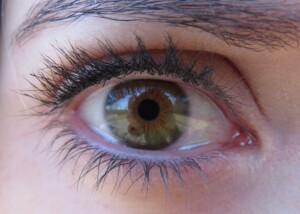Yes, cancer can actually cause one eye to begin tearing, a condition called unilateral (one-sided) epiphora.
There are far more common causes of this situation – but tumors are not excluded from possible causes of one eye mysteriously getting very watery.
“The lacrimal glands are the glands that produce tears to lubricate your eyes,” begins Gene Liu, MD, MMM, and Chief, Division of Otolaryngology, Cedars-Sinai Medical Group.
“As you blink, the tears are spread across the eyeball itself and then drain through small pipes called the nasolacrimal ducts, or tear ducts, into the nose,” explains Dr. Liu.
“Epiphora is the medical term for a watery eye and can happen with irritation of the eye, a problem with eyelid position or tone, or something that is causing an issue along the drainage pathway.”
An obstruction in the drainage pathway, caused by a cancerous or benign tumor, will result in a buildup of tears.

The eye will then water up, sometimes to the extent that full tears are dripping down one’s face.
The unilateral epiphora can be caused by a benign lacrimal sac tumor or a malignant mass.
Lacrimal Gland Tumors
• 72 percent are cancer and 28 percent are benign, according to reviewofoptometry.com, but only 50 percent are cancer, according to reference.medscape.com.
• Cancer must be ruled out when a patient presents with one eye that keeps tearing– especially if there are other symptoms.
• “The likelihood that epiphora is caused by a cancer of any part of the nasolacrimal system or sinuses is extremely low,” says Dr. Liu.
“These types of problems are not only very rare, but usually also would cause a lot of other symptoms.”
How rare are these malignant masses?
A report in Smith and Nesi’s Ophthalmic and Plastic Reconstructive Surgery (2012) says, “Approximately 750 cases [of malignant AND benign lacrimal sac tumors] have been reported in the literature over the last century, of which 50 to 100 percent were malignant.”
A report in a 2013 Ophthalmic Plastic Reconstructive Surgery (a different journal than above) states, “Lacrimal sac tumors are rare with approximately 300 cases described in the literature.”
A report in the online journal Cancer (2011) states, “Forty-six patients with malignant epithelial neoplasms of the lacrimal apparatus were treated at a single institution from 1945 through 2008.”
And finally: “Whereas there are a myriad of small case series and reports, fewer than 250 cases have been reported in the international literature and population data are scarce.” (JAMA Otolaryngology – Head & Neck Surgery, 2014)
So based on the above excerpts, you should be very reassured that the odds that your unilateral epiphora being caused by cancer are exceptionally unlikely.
Furthermore, the most common age for diagnosis is in the 30s, and the second most common age is in the teens.
If you’re in your 30s, don’t panic. Reread the above data to absorb just how incredibly rare this cancer is.
Symptoms of Lacrimal Gland Tumor Other than Epiphora
• Double or blurry vision
• Pain in or near eye
• Eyelid fullness or lump in eyelid
• Swelling around the eye
To be fair, a brief coverage of another type of cancer that can cause one eye to tear needs to be made.
A tumor can form in the naso-pharyngeal cavity. These are called paranasal or sinus tumors.
According to hopkinsmedicine.org, some possible causes are:
• Exposure to industrial chemicals
• HPV infection
• Exposure to leather, wood, nickel, textile, chromium or flour dust
• Cigarette smoking
• Not all paranasal tumors have known causes.
Cancer.org says that about 2,000 U.S. people a year are diagnosed with a paranasal tumor. Eighty percent of patients are at least 55 and most are men.
Symptoms of a Paranasal Tumor Other than Epiphora
• Bulging eye
• Vision problems
• Persistent sinus congestion
• Nasal drip
• Frequent nosebleeds
• Change in voice
• Reduced sense of smell
• Headache
• Facial numbness
• Loose teeth
• Trouble opening mouth
Benign Causes of One Eye Tearing
“A gradual onset of epiphora with no other symptoms or findings is almost always due to narrowing or scarring of the nasolacrimal duct,” says Dr. Liu.
“This can happen with the development of casts or stones [hardened debris inside the drainage system], from inflammation of the nose and sinuses [infection], from trauma, as a result of inflammatory disease such as sarcoidosis, and many other obscure medical reasons.”
– Canalicular obstruction (caused by debris from lids, lashes, makeup, conjunctivitis, age related constriction). The canaliculum is part of the drainage system.
– Canaliculitis (inflammation of canaliculum)
– Cysts
– Dacryocystitis (lacrimal sac infection)
– Dacryocystocele (lacrimal sac enlargement due to congenital problem)
– Facial (blackhead extractions on the nose)
– Lacrimal diverticulum (herniation)
– Laceration (tiny cut)
A condition called recurrent corneal erosion can also cause only one eye to water up too much.
Corneal irritation (from past trauma such as walking into a protruding tree branch or a fingernail contacting the cornea) triggers hyperlacrimation. This condition can develop months or years after the trauma.
Parting Thoughts
• If one eye gradually or suddenly begins tearing (unilateral epiphora), chances are extremely unlikely that the cause is cancer.
• Don’t panic. See if it runs its course and tapers off after a week or so.
• Be on the ball for other new-onset symptoms that seem associated.




























